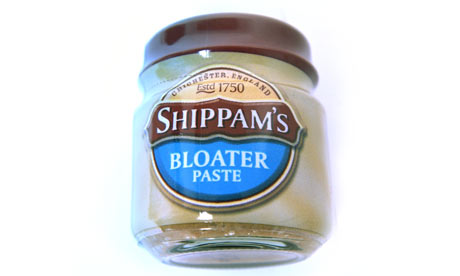
To say that my grandfather was an unadventurous eater would be a tremendous understatement. He was a martyr to his 'dicky tummy' and, throughout his life, whenever a food gave him 'the pip' he'd expunge it from his repertoire forever. By the time he died he was surviving entirely on a diet of weak tea and sandwiches - supermarket sliced and Shippams beef paste.
Looking back, there are two reasons for this. Pop Ron's was not a generation which lightly bothered their doctors so he'd never have received an early diagnosis of gastric reflux, IBS, diverticulitis or Crohn's. It was just the sort of thing one lived with.
He was also part of the worst generation in British history for eating. He was born in a Welsh pit village and as a child watched it destroyed by the depression. He spent the war as an Intelligence Officer debriefing young Canadian bomber crews who'd been shot to pieces over Germany, then spent the rest of his working life as the headmaster of an underfunded state school in a devastated urban sink. His generation didn't care for food much and in his case this was exacerbated by an entirely justifiable and deep-seated anhedonia.
I too, in a small way, ended up on the family 'paste diet'. I'd like to think it was a subconscious act of solidarity with the old man but, truth be told it was the appalling and intractable conservatism of childhood that, through my 13th and 14th years meant I refused almost every food except white bread and Shippams sardine & tomato paste.
Meat and fish pastes are still around. They exist in a weird little timewarp of forgotten but much-loved Victorian prepared foods along with corned beef, custard powder and tinned meat pies. We should be thinking fondly of them, potted ox-cheek, brown shrimp, rabbit and haddock pepper the menus of every Mod Brit restaurant in the country - achingly fashionable statements of thrift and authenticity. We should even doff our hats at the cooking method. Pastes are actually cooked inside those little pop-top jars - the same way as the foie gras or rillettes we disloyally rush to buy on trips to French supermarkets. Should you doubt me, read Sue Shepard's masterful work on the subject; 'Pickled, Potted and Canned' which isn't subtitled 'How meat paste created the British Empire' but should have been.
Of course you probably won't be aware of meat paste. It lives on the granny shelves of your supermarket. Right down there at the bottom, just before the catfood, along with the tinned mince, the Camp coffee and the last bottle of gravy browning. You won't see it unless you're moving very slowly, dragging a trolley, bent double with arthritis and trying to work out how to live on the last 8p of your pension. If you're a straight-backed shopper of average height, your eyeline will be occupied by overpackaged premium mueslis - you're not meant to notice the soul-sapping depressiveness of the knee-height shelves.
But last week I did. I don't know what made me look down but there it was, a little tray of the store's own-brand pastes, and I realised that those two flavours which had run like veins through my childhood hadn't passed my lips in 30 years. It seemed an amazing opportunity. I could instantly recall the bland suavity of the beef paste and, though nobody had invented it yet, the genuinely umami jolt of the sardine and tomatoes. How could I resist?
I baked a special loaf for the taste test. I was looking forward to trying these flavours again, expecting some Blumenthalesque surge of emotional recognition. I partly wanted something close textured and very white to smear them on, something that would replicate the bread I remembered but also, if I'm honest, though I'm happy to eat almost anything in pursuit of gustatory sensation I'd sooner consume my own ear-wax than Mother's Pride.
The beef paste has a smell I don't remember … a non-specific meatiness on the catfood spectrum with a light descant of metallic notes. The taste fails to live up even to that promise. It's distinguished by nothing but its utter blandness and I suddenly realise that I've laid it on in a thick curl like some poncey pate. Pop would have spread it thin enough to see the bread through it then have put three quarters of the jar back in the fridge for the rest of the week. Looking at the ingredients I realise that beef paste now features chicken and chicken skin. It probably did then too but now I feel I can actually taste it.
The sardine and tomato paste still smells as unholy as it ever did. It could incubate in a Tupperware lunchbox through a morning of double Nuffield physics until it smelt like an abandoned fishing smack. Much like Marmite though, eating it was about sensation more than a flavour, a brutal mouth mugging which somehow fixed in my teenage mind as enjoyable.
Now it sits on the bread, the consistency of baby poop and - there's no other word for it - mings. A mouthful produces the faintest ghost of recollection but then so would the abandoned fishing smack. The ingredients list features mackerel in large proportions. I screw the lids back on and consign the lot to the bin. It's then that I notice that the lids of the jars still bear the same legend they did then, "reject if centre can be depressed" - which, under the circumstances now seems prophetic wisdom.
Have you tried something that you remember happily from your childhood and found it didn't match up to memory? Are some foods best left alone? Can we ever go back again?







